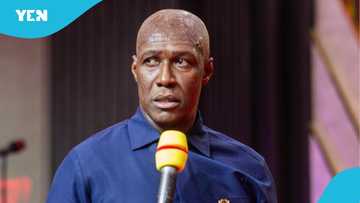Dumsor Levy: Bawumia Slams Increased Tax on Fuel, Calls it Worse Than E-Levy
- Former Vice President Dr Mahamudu Bawumia has criticised the government for the GH¢1 increase in the Energy Sector Levy
- Bawumia accused the Mahama administration of misleading Ghanaians during the campaign for the 2024 election
- The government has explained that the increase in taxes on fuel was meant to help clear the US$3.1 billion energy debt
Former Vice President Dr Mahamudu Bawumia has criticised the government for raising a tax on petroleum products.
Speaking in Cape Coast on June 4, Bawumia accused the Mahama administration of campaigning on deceptive promises because of the introduction of what he called a dumsor levy.

Source: Facebook
The increase in the Energy Sector Levy will see an extra GH¢1 tax on every litre of fuel bought.
Bawumia believes this increased tax is more costly than the scrapped Electronic Transfer Levy.
“Initially, they said they would scrap the E-Levy we had introduced, and they’ve done that. But now, they have introduced the Dumsor Levy, and it is eight times the E-Levy. Now, when you buy one litre of petrol, you will pay one cedi as tax.”
He also warned Ghanaians to expect even more taxes under the current administration.
When announcing the tax increase in Parliament, Finance Minister Dr Cassiel Ato Forson said it was necessary to clear the alarming US$3.1 billion energy debt as of the end of March 2025.
Forson assured that consumers would not immediately feel the impact at the pumps because of the strengthening of the cedi.
"Our simulations suggest that there will be no increase in the ex-pump price of petrol and diesel in the next window beginning today if the levy is imposed. This is because of a strong Ghana Cedi."
President John Mahama also defended the increase in the fuel levy, describing it as a necessary and justifiable step to stabilise Ghana’s energy sector.
Speaking on the rationale behind the move on June 4, Mahama acknowledged the public’s concerns but emphasised that the decision was crucial to securing Ghana’s energy future.
“This decision, though difficult, is necessary and justifiable."
The Minority Caucus opposed the bill and boycotted the approval process on June 3.
Energy minister defends increased tax on fuel
The Minister for Energy and Green Transition, John Jinapor, defended the increased levy, saying it is the right time to impose it.
He said the government refrained from introducing the levy when it assumed office due to the high cost of petroleum products at the time.
"Fuel was around GH¢16.00, and a sensitive government will not slap a tax when fuel is GH¢16.00. You couldn't have imposed that tax around that time when fuel was still very high, and so you needed to work to bring fuel down to this level and share the gain with Ghanaians."
What else are experts saying about the tax?
Nsiah told YEN.com.gh that the increase in the levy, which will see an extra GH¢1 tax on every litre of fuel bought, was unjustified. The levy stood at GH¢0.95 before the increment.

Read also
Opambour pledges support for the increased energy sector levy, calls for Ghanaians to pay Gh₵2
Nsiah noted that there are more efficient ways to address the debt and inefficiency challenges in the energy sector.
"The major contributors are that there is a lot of mismanagement. There is a lot of policy inconsistency. There are a lot of agreements that do not favour the Ghanaian with respect to power purchase agreements and also gas supply contracts.”
He also noted that the government is complicit because of consistent arrears hampering power distributors like the Electricity Company of Ghana.
Nsiah also reminded that similar levies, like the Tema Oil Refinery Recovery Levy under the Kufuor administration, have been introduced but to limited effect.
He also expects some negative effects to take hold because of the extra cost for fuel, mainly less disposable income for households.
"What it means is that the government is reducing the savings culture as well as the investment culture of the consumer."
Energy Minister downplays power crisis fears
Earlier, YEN.com.gh reported that Jinapor said there was no power crisis on the horizon, amid fuel stock concerns.
The Energy Minister earlier said the government was taking proactive steps to maintain electricity stability.
Jinapor made these comments after reports emerged that Ghana had 2.6 days’ worth of fuel stock left to generate more power.
Source: YEN.com.gh




